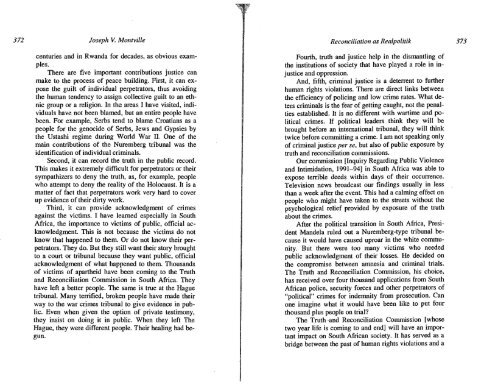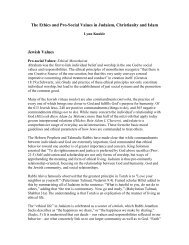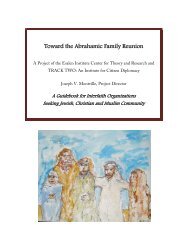Reconciliation as Realpolitik - Abrahamic Family Reunion
Reconciliation as Realpolitik - Abrahamic Family Reunion
Reconciliation as Realpolitik - Abrahamic Family Reunion
You also want an ePaper? Increase the reach of your titles
YUMPU automatically turns print PDFs into web optimized ePapers that Google loves.
372 Joseph V. Montville<br />
<strong>Reconciliation</strong> <strong>as</strong> <strong>Realpolitik</strong><br />
373<br />
centuries and in Rwanda for decades, <strong>as</strong> obvious examples.<br />
There are five important contributions justice can<br />
make to the process of peace building. First, it can expose<br />
the guilt of individual perpetrators, thus avoiding<br />
the human tendency to <strong>as</strong>sign collective guilt to an ethnic<br />
group or a religion. In the are<strong>as</strong> I have visited, individuals<br />
have not been blamed, but an entire people have<br />
been. For example, Serbs tend to blame Croatians <strong>as</strong> a<br />
people for the genocide of Serbs, Jews and Gypsies by<br />
the Ust<strong>as</strong>hi regime during World War II. One of the<br />
main contributions of the Nuremberg tribunal w<strong>as</strong> the<br />
identification of individual criminals.<br />
Second, it can record the truth in the public record.<br />
This makes it extremely difficult for perpetrators or their<br />
sympathizers to deny the truth, <strong>as</strong>, for example, people<br />
who attempt to deny the reality of the Holocaust. It is a<br />
matter of fact that perpetrators work very hard to cover<br />
up evidence of their dirty work.<br />
Third, it can provide acknowledgment of crimes<br />
against the victims. I have learned especially in South<br />
Africa, the importance to victims of public, official acknowledgment.<br />
This is not because the victims do not<br />
know that happened to them. Or do not know their perpetrators.<br />
They do. But they still want their story brought<br />
to a court or tribunal because they want public, official<br />
acknowledgment of what happened to them. Thousands<br />
of victims of apartheid have been coming to the Truth<br />
and <strong>Reconciliation</strong> Commission in South Africa. They<br />
have left a better people. The same is true at the Hague<br />
tribunal. Many terrified, broken people have made their<br />
way to the war crimes tribunal to give evidence in public.<br />
Even when given the option of private testimony,<br />
they insist on doing it in public. When they left The<br />
Hague, they were different people. Their healing had begun.<br />
Fourth, truth and justice help in the dismantling of<br />
the institutions of society that have played a role in injustice<br />
and oppression.<br />
And, fifth, criminal justice is a deterrent to further<br />
human rights violations. There are direct links between<br />
the efficiency of policing and low crime rates. What deters<br />
criminals is the fear of getting caught, not the penalties<br />
established. It is no different with wartime and political<br />
crimes. If political leaders think they will be<br />
brought before an international tribunal, they will think<br />
twice before committing a crime. I am not speaking only<br />
of criminal justice per se, but also of public exposure by<br />
truth and reconciliation commissions.<br />
Our commission [Inquiry Regarding Public Violence<br />
and Intimidation, 1991-94] in South Africa w<strong>as</strong> able to<br />
expose terrible deeds within days of their occurrence.<br />
Television news broadc<strong>as</strong>t our findings usually in less<br />
than a week after the event. This had a calming effect on<br />
people who might have taken to the streets without the<br />
psychological relief provided by exposure of the truth<br />
about the crimes.<br />
After the political transition in South Africa, President<br />
Mandela ruled out a Nuremberg-type tribunal because<br />
it would have caused uproar in the white community.<br />
But there were too many victims who needed<br />
public acknowledgment of their losses. He decided on<br />
the compromise between amnesia and criminal trials.<br />
The Truth and <strong>Reconciliation</strong> Commission, his choice,<br />
h<strong>as</strong> received over four thousand applications from South<br />
African police, security forces and other perpetrators of<br />
"political" crimes for indemnity from prosecution. Can<br />
one imagine what it would have been like to put four<br />
thousand plus people on trial? .<br />
The Truth -and <strong>Reconciliation</strong> Commission [whose<br />
two year life is coming to and end] will have an important<br />
impact on South African society. It h<strong>as</strong> served <strong>as</strong> a<br />
bridge between the p<strong>as</strong>t of human rights violations and a




